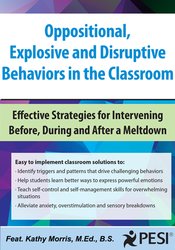

Do you work with students who exhibit explosive behaviours that interfere with their ability to effectively and efficiently navigate their environment? They appear willful, obnoxious, over reactive, and unfeeling. They lose control of their ability to cope or regulate their behaviour, which can send them spiralling into a gut wrenching meltdown.
Watch expert Kathy Morris, M.Ed., B.S., and learn proven strategies and techniques to help students with ADHD, ODD, autism, executive functioning, learning disabilities, anxiety, and depression de-escalate before a full blown meltdown ensues, developing self-control and self-management skills to prevent future meltdowns and learn appropriate/replacement behaviours. Dozens of strategies will be taught through dynamic video case examples and demonstrations. “Teach them in the way they learn” will be a mantra throughout the recording.
Walk away with these intervention strategies and more:
This online program is worth 6.25 hours CPD.
| File type | File name | Number of pages | |
|---|---|---|---|
| Manual - Oppositional, Explosive and Disruptive Behaviors in the Classroom (56.6 MB) | 90 Pages | Available after Purchase |

Kathy Morris, MEd, BS, has over 42 years of experience working with children and adolescents with severe behavioral difficulties, autism, ADHD, executive dysfunction, and cerebral palsy. She has been a speech therapist, teacher for self-contained programs, resource teacher, and first grade teacher. Kathy's business, igivuWings, has reached families, educators, counselors, speech pathologists, occupational therapists, and medical professionals throughout the world.
Kathy was a diagnostician/supervisor for all grade levels and a LIFE Skills/autism/behavior/assistive technology consultant at a Texas education service center before leaving to start her own business. A prolific speaker, Kathy has keynoted many national/international conferences. She provides technical assistance in classrooms across the US, Canada, and several international countries. Kathy is a frequent guest on a local news program promoting research-based techniques for working with children and adolescents with executive functioning deficits, ADHD, and Autism Spectrum Disorder.
Kathy was honored as Outstanding Educator for Children with Disabilities (1997) and a delegate for the President's Commission on Special Education (2002).
Speaker Disclosures:
Financial: Kathy Morris maintains a private practice. She has authored an audio product, books and a DVD product which are published by the Bureau of Education & Research. Kathy Morris is an consultant for Assistive Technology, Inc. She receives a speaking honorarium and recording royalties from PESI, Inc. All relevant financial relationships with ineligible organizations has been mitigated.
Non-financial: Kathy Morris is the mother of adult children with autism spectrum disorders.
Functions of a Meltdown
Identify Triggers that Drive Challenging Behaviors Related to:
Sensory Strategies
Executive Functioning Strategies
Self-Regulation Strategies
Social/Emotional Communication Strategies
Explosive Behavior Strategies
Techniques for After the Meltdown
Hands-on Activities
| 5 |
|
| 4 |
|
| 3 |
|
| 2 |
|
| 1 |
|
Satisfaction Guarantee
Your satisfaction is our goal and our guarantee. Concerns should be addressed to info@pesi.co.uk or call 01235847393.
Please wait ...